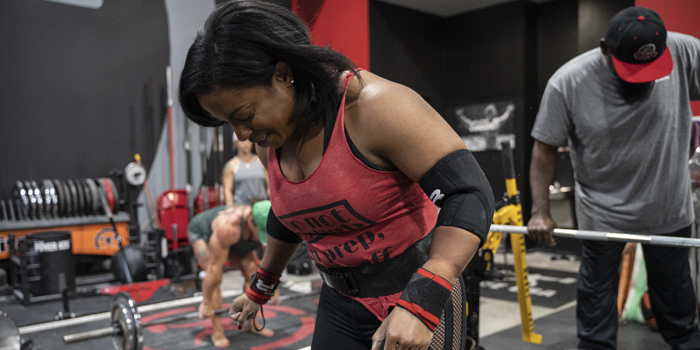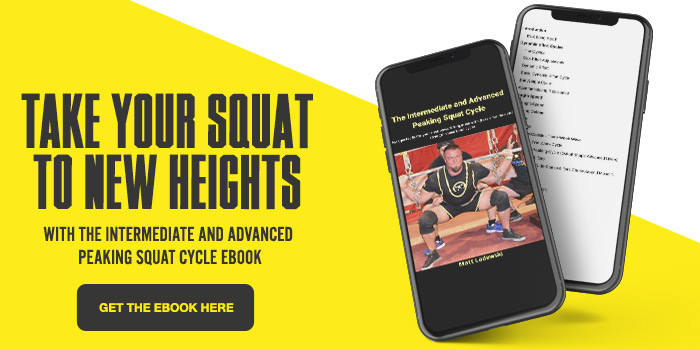
I love strength training. This love keeps me disciplined to continue expanding my knowledge. A big part of that process is to look back over my career as a lifter and coach. Therefore, I'm constantly analyzing what I did great and could have done better.
Live, Learn, Pass On
A big part of how things progress is by older generations passing on knowledge to the younger generations so the younger generations don't make the same mistakes. They are free to make their own more advanced mistakes. They now have more time to break through new plateaus. It's remembering our history and passing on our knowledge learned from it.
Learning from the past and gaining knowledge works in the big picture and on an individual level. Just banging away at the gym will allow for some gains, but in the long run, you will never achieve greatness that way. Education is just as important as the physical work.
LISTEN: #139 Stacy Burr | All-Time World Record Holder 1400 LBS Total
You can read, spend time with better lifters, attend seminars, or even hire coaches. Don't be afraid to venture out. At some point, though, we must acknowledge the past. If we ignore our past, we are destined to repeat it over and over without gains.
Say you do a meet. Analyze your meet prep afterward. Although this is small, look to your past to gain knowledge for your future. Despite this being a very simple concept, many lifters don't utilize the past.
Use Your Lifting Log
Learning from your past is not new or even hard, yet I see this aspect getting missed or half-assed.
I can't even count how many lifters I have seen keep journals of their training, think they are recording something important, but they never even use this information. They spend all this time writing every single set and rep down. Some even write how they felt or what their nutrition was. Many of these lifters never go back through the data other than to see if they hit a PR.
They may have years of these journals but still do the same thing they have always done, yielding the same results. How many guys have you seen in the gym for years and years, yet they look the same while still lifting about the same weight? Notice how they have all the right lifting apparel, gym bag, pre-workout drinks, and post-workout drinks while still writing in that damn journal.
I don't get it. If you are going to take the time to write in that thing, then don't be afraid to actually utilize the written history. Don't just look to see if you got stronger or hit a PR. Look to find out what changed to hit that PR. See what you did when not hitting PRs to understand why or what to change. Look to see when an idea worked and figure out why. Use those training logs as a tool to continue striving for your goal. Otherwise, take a picture or video to look at it later.
Learn from the Struggles
I believe that we rarely learn much from great successes or good times. Instead, we learn the most from struggles and failures. I look at what most people would say are struggles and failures as positive opportunities. If I take the time to look at these situations with a clear, logical mind, I can learn so much from them—knowledge that will help me create a better future and more success in that future.
I see many lifters who want to forget tough times or failures. They only want to remember good times and successes. I love telling stories of my failures because it shows I will always get back up fighting as a more knowledgeable warrior. It's also great to show people how failure is part of the process. I have learned way more from my failures than I ever did from my successes. Becoming great is a process, so it's paramount we learn from our struggles and mistakes to make them positive parts of our lives.
Think about it this way, if everything is going great, why would you change it? Yes, you do learn some from that situation. You understand what you're doing right is working, but that is it. If you're struggling, you are willing to try new and different things. If you're struggling, you will spend more time researching and learning. You'll be more willing to ask others and seek out new ideas. It's similar to giving a man a fish or teaching him how to fish—either you feed him for a meal or feed him for life.
Why do we fall? We fall so we can learn to pick ourselves back up. The more struggles I overcome in my training, the more knowledge I have for the next time I hit a plateau or have an issue. Most of the best knowledge I have ever gotten is from people who have been through many life struggles.
Change is Inevitable
No matter who you are, you will change in life, which will change what works for you. When you age, things change. When you get stronger, things change. When you get bigger or smaller, things change. When you get an injury, things change. What I did to bench 500 was not what I had to do to bench 800. The hard times teach us to learn and adapt to the situation. The difficult and tough times teach us how to learn, adapt, and discover new ways.
It comes down to your perspective and even your attitude. So many lifters jump to negative feelings about mistakes instead of seeing the reality of the situation. People would ask if I was pissed about a mistake like bombing out of a meet. I always replied, "I now have more knowledge, so why would I be pissed off?" You see, the meet was a success to me. Sure I always wanted to win everything, but those were just feelings. I knew lifting was a sport of attrition, and I was in it for the long haul. I knew what I needed more than anything was knowledge. If I kept working hard, learning, and improving, I would eventually get where I wanted. Mistakes and struggles are to be thought about and learned from. Hell, those things are gifts from the universe!
I think it is about taking control of your ego. It is about understanding that we are human and will all make mistakes. Ultimately, we are all different and need to find our path. So, learn everything you can from knowledgeable and experienced lifters while at the same time learning to trust yourself. Who knows, maybe someday you'll find yourself breaking world records and exploring new ground—a place where there is no one to ask what you need to do next, and you have to figure it out for yourself.
Ultimately, I put up some all-time highest numbers because of all my mistakes. I should say because of how I looked at and was willing to learn from all my mistakes. It made me stronger and more resilient and taught me how to learn. For this to happen, I had to look at my past and analyze failure for nuggets of wisdom.
Don't stress about making mistakes. Instead, make sure you're learning from your mistakes. Take the time to review your past. Note what you did good and what worked for you. See what mistakes you made and what knowledge you can take from them. Use your mistakes and struggles as positive things that are making you a better lifter and person. Take it all in—the good, the bad, and the ugly! Then regurgitate it in the form of knowledge and success!
Chad Aichs is a world-class and elite powerlifter in the SHW division. He began training seriously for powerlifting in 1999 in Sparks, Nevada, where he currently trains at American Iron Gym. In the ten years since he started, Chad has proven to be one of the strongest lifters in the world. His best lifts are an 1173 squat, 821 bench press, and a 755 pull. Aichs' best total is 2733, which makes him one of the top lifters of all time.










